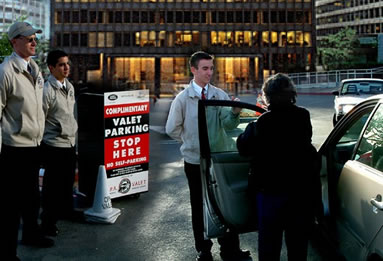Our overtime pay attorneys handle cases for employees who earn the majority of their wages through tips. Common tipped employees include waiters, waitresses, hotel employees, valet staff, golf course workers, and other workers in the hospitality business. The employees often work more than 40 hours per week but do not receive overtime pay. This can be a violation of the Fair Labor Standards Act (FLSA).
Tipped employees are those who customarily and regularly receive more than $30 a month in tips. Tips actually received by tipped employees may be counted as wages for purposes of the FLSA, but the employer must pay not less than $2.13 an hour in direct wages. If an employer elects to use the tip credit provision the employer must:
1.Inform each tipped employee about the tip credit allowance (including amount to be credited) before the credit is utilized.
2.Be able to show that the employee receives at least the minimum wage when direct wages and the tip credit allowance are combined.
3.Allow the tipped employee to retain all tips, whether or not the employer elects to take a tip credit for tips received, except to the extent the employee participates in a valid tip pooling arrangement.
If an employee’s tips combined with the employer’s direct wages of at least $2.13 an hour do not equal the minimum hourly wage ($5.15 an hour) the employer must make up the difference.
When an employee receives both tips and some other type of pay, the tip credit is available only for the hours spent in the tipped occupation. The Act permits an employer to take the tip credit for time spent in duties related to the tipped occupation, even though such duties are not by themselves directed toward producing tips, provided such duties are incidental to the regular duties and are generally assigned to such occupations. Where tipped employees are routinely assigned to maintenance, or where tipped employees spend a substantial amount of time (in excess of 20 percent) performing general preparation work or maintenance, no tip credit may be taken for the time spent in such duties.
A compulsory charge for service, for example, 20 percent of the restaurant bill, is not a tip. These charges are part of the employer’s gross receipts. Where service charges are imposed and the employee receives no tips, the employer must pay the entire minimum wage and overtime required by the Act.
Where tips are charged on a credit card and the employer must pay the credit card company a percentage on each sale, then the employer may pay the employee the tip, less that percentage. This charge on the tip may not reduce the employee’s wage below the required minimum wage. The amount due the employee must be paid no later than the regular payday and may not be held while the employer is awaiting reimbursement from the credit card company.
These calculations are used to determine the amount of overtime pay that an employer is required to pay the employee who works more than 40 hours per week. The amount is almost always 1.5 times the hourly rate of pay. In the case of tipped employees, the rate is determined by averaging out the hourly rate for the employee based upon total earnings, that is, any hourly rate plus tips divided by hours worked.
There have been many successful lawsuits filed for tipped employees who are not compensated for overtime by their employer. If you are receive tips as part or as total compensation for your job and work more than 40 hours a week, you may be eligible to file a tipped employee overtime lawsuit. Our experienced and qualified legal team with provide you with a free consultation on your claim and if we accept your case, we will not charge any legal fees or costs unless we are successful in winning you a settlement. Call us today at (855) 754-2795 to discuss your case right now!
